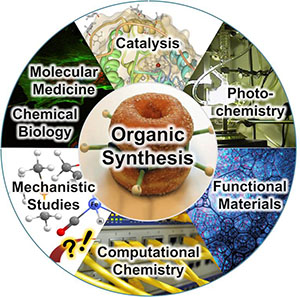Research areas of the Institute of Organic Chemistry

At present, the core of the Institute of Organic Chemistry is formed by five appointed professors (Bernd Goldfuß, Axel Griesbeck, Stephanie Kath-Schorr and Hans-Günther Schmalz). In addition, the institute is home to the research groups of adjunct professors Ralf Giernoth and Mathias Schäfer (MS) as well as permanent scientists Dirk Blunk and Daniel Friedrich (NMR).
Research at the Institute of Organic Chemistry in Cologne is multi-faceted with emphasis on areas of the synthesis of complex molecules (natural products, biological agents, nucleic acid derivatives, functional compounds), the development and mechanistic study of catalytic and photochemical processes as well as computer-assisted modelling of organo-chemical reactions.
The multi-stage stereoselective synthesis of bioactive natural products and analogues as well as the development of transition metal-catalysed synthetic methods are in the focus of Hans-Günther Schmalz’ research. Current successful research topics of the Schmalz group are the development of proline-based secondary structure mimetics (as inhibitors of protein interaction), of enzyme-triggered CO-releasing molecules and of new chiral P,P ligands for the enantioselective Co, Ni, and Pd catalysis.
The research area of Stephanie Kath-Schorr concerns the field of chemical biology, particularly the synthesis and analysis of chemically-modified ribonucleic acids. Her group develops artificial ribonucleic acids assembled from synthetic building blocks which exhibit a range of new functions ranging from detection of biologically active molecules to ribonucleic acids with catalytic activity.
The name Axel Griesbeck stands for photochemistry. His work group researches questions on mechanistic aspects as well as applications in synthesis such as e.g. the light-controlled synthesis of bioactive peroxides. Bernd Goldfuß bridges the gap between experiment and theory through computer-assisted modelling of (not only) catalytic transformations, in particular with regard to understanding stereoselectivity.
The research of Dirk Blunk concerns the synthesis of organic compounds with innovative material properties, and Ralf Giernoth’s area of expertise is the use of spectroscopic methods, for instance for the examination of reactions in ionic liquids.
As diverse as Organic Chemistry in Cologne may be, a joint interest of most groups lies in the synthesis of organic compounds with a function, be it catalysts, materials, biologically active (natural or non-biogenic) molecules or nucleic acid building blocks. Consequently, there are numerous productive cooperations between Organic Chemistry and the neighbouring disciplines, from physics to the life sciences up to medicine. Work groups of the institute are integrated into the crosstown graduate school ‘SusChemSys’ as well as DFG priority programmes and joint research projects such as the research training group RELOC centred in the Institute of Biochemistry. Furthermore, there are numerous cooperations with industry and partners from academic institutions in and outside Germany.